Related Research Articles

James Randi was a Canadian-American stage magician, author, and scientific skeptic who extensively challenged paranormal and pseudoscientific claims. He was the co-founder of the Committee for Skeptical Inquiry (CSI), and founder of the James Randi Educational Foundation (JREF). Randi began his career as a magician under the stage name The Amazing Randi and later chose to devote most of his time to investigating paranormal, occult, and supernatural claims. Randi retired from practicing magic at age 60, and from his foundation at 87.
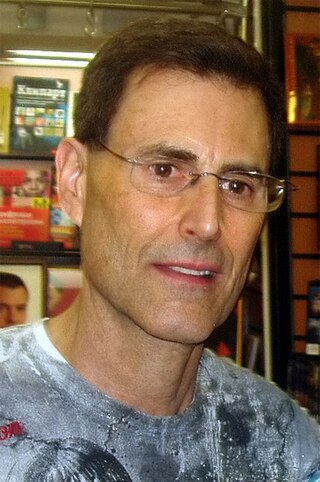
Uri Geller is an Israeli-British illusionist, magician, television personality, and self-proclaimed psychic. He is known for his trademark television performances of spoon bending and other illusions. Geller uses conjuring tricks to simulate the effects of psychokinesis and telepathy. Geller's career as an entertainer has spanned more than four decades, with television shows and appearances in many countries. Magicians have called Geller a fraud because of his claims of possessing psychic powers.
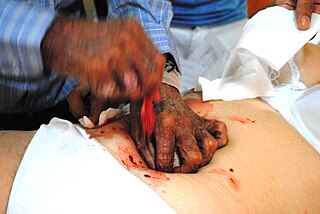
Psychic surgery is a pseudoscientific medical fraud in which practitioners create the illusion of performing surgery with their bare hands and use sleight of hand, fake blood, and animal parts to convince the patient that diseased lesions have been removed and that the incision has spontaneously healed.
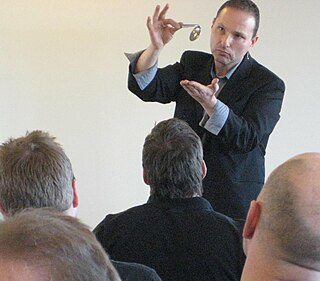
Spoon bending is the deformation of objects, especially metal cutlery, purportedly by paranormal means. It is a common theme for magic tricks, which use a variety of methods to produce the effect. Performers commonly use misdirection to draw their audience's attention away while the spoon is manually bent. Another method uses a metal spoon that has been prepared by repeatedly bending the spoon back and forth, weakening the material. Applying light pressure will then cause it to bend or break.
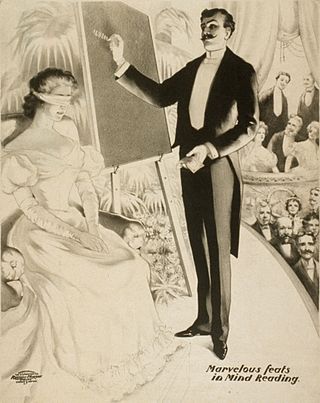
Mentalism is a performing art in which its practitioners, known as mentalists, appear to demonstrate highly developed mental or intuitive abilities. Mentalists perform a theatrical act that includes special effects that may appear to employ psychic or supernatural forces but that is actually achieved by "ordinary conjuring means", natural human abilities, and an in-depth understanding of key principles from human psychology or other behavioral sciences. Performances may appear to include hypnosis, telepathy, clairvoyance, divination, precognition, psychokinesis, mediumship, mind control, memory feats, deduction, and rapid mathematics.
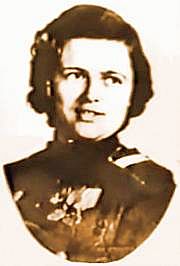
Nina Kulagina, Ninel Sergeyevna Kulagina was a Russian woman who claimed to have psychic powers, particularly in psychokinesis. Academic research of her phenomenon was conducted in the USSR for the last 20 years of her life.

The Pigasus Award is the name of an annual tongue-in-cheek award, which was presented by the late James Randi, a skeptic. The purpose of the award was to expose parapsychological, paranormal, and psychic frauds whom Randi had noted over the previous year. Randi usually made his announcements of the awards from the previous year on April 1.

Mediumship is the practice of purportedly mediating communication between familiar spirits or spirits of the dead and living human beings. Practitioners are known as "mediums" or "spirit mediums". There are different types of mediumship or spirit channelling, including séance tables, trance, and ouija. The practice is associated with spiritualism and spiritism. A similar New Age practice is known as channeling.
Judy "Zebra"Knight is an American spiritual teacher and author known for her purported channelling of a spiritual entity named Ramtha. Critics consider her to be a cult leader.
Morris Lamar Keene, was a spirit medium in Tampa, Florida and at Camp Chesterfield Indiana, where he was known as the "Prince of the Spiritualists". He was also the trustee of Universal Spiritualist Association. He is best known for his 1976 book The Psychic Mafia, in which he coined the term "true-believer syndrome".

In spiritualism, ectoplasm, also known as simply ecto, is a substance or spiritual energy "exteriorized" by physical mediums. It was coined in 1894 by psychical researcher Charles Richet. Although the term is widespread in popular culture, there is no scientific evidence that ectoplasm exists and many purported examples were exposed as hoaxes fashioned from cheesecloth, gauze or other natural substances.
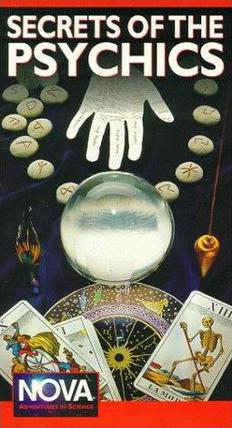
"Secrets of the Psychics" is a 1993 episode of the PBS series NOVA, presented by retired illusionist and paranormal investigator James Randi. Also appearing in stock footage are Peter Popoff, Uri Geller, and many others. It contains historical footage of Randi's 25 years of testing claims of supernatural powers, as well as more current footage of his trip to Russia to investigate the people making paranormal claims there. Belief in the paranormal has thrived in Russia since the dissolution of the USSR.

Banachek is an English mentalist, magician, and "thought reader".
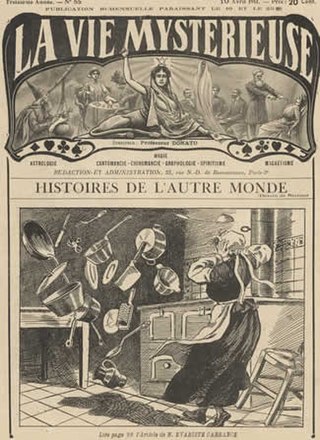
Telekinesis is a purported psychic ability allowing an individual to influence a physical system without physical interaction. Experiments to prove the existence of telekinesis have historically been criticized for lack of proper controls and repeatability. There is no reliable evidence that telekinesis is a real phenomenon, and the topic is generally regarded as pseudoscience.

Dan Korem is an American investigative journalist, author, documentary producer, speaker, and researcher. His focus is issues and practical applications related to snapshot behavioral reads. He is the author of several books, including: Snapshot - Reading and Treating People Right the First Time (2015), The Art of Profiling: Reading People Right the First Time, Expanded 2nd Edition (2012), Rage of the Random Actor - Disarming Catastrophic Acts and Restoring Lives (2005), Suburban Gangs: The Affluent Rebels (1995), and Streetwise Parents, Foolproof Kids (1992)
Stanford Research Institute in Menlo Park, California carried out research on various phenomena characterized by the term parapsychology from 1972 until 1991. Early studies indicating that phenomena such as remote viewing and psychokinesis could be scientifically studied were published in such mainstream journals as Proceedings of the IEEE and Nature. This attracted the sponsorship of such groups as NASA and The Central Intelligence Agency.
Masuaki Kiyota is a Japanese psychic known for his alleged ability of thoughtography.
Antonio C. Agpaoa (1939–1982) most well known as Tony Agpaoa was a Filipino practitioner of psychic surgery.

Psychic Blues: Confessions of a Conflicted Medium is a memoir by Mark Edward about his time working as a psychic entertainer. Published in 2012, the book covers Edward's controversial career as both a performer and a skeptical activist.
References
- ↑ "Hydrick, James Alan". www.meganslaw.ca.gov. State of California Department of Justice . Retrieved January 8, 2023.[ permanent dead link ]
- ↑ "Psychic Confession". YouTube . April 17, 2011. Retrieved July 25, 2022.
- ↑ "FindLaw's California Court of Appeal case and opinions". Archived from the original on July 25, 2022. Retrieved July 25, 2022.
- 1 2 Korem, Dan (1983). Psychic Confession on YouTube (also transcript) Archived August 1, 2009, at the Wayback Machine
- ↑ Rivera, Carla (January 7, 1989). "Suspect With Many Images: Man Denies Guilt in Molestations". Los Angeles Times . Archived from the original on July 15, 2015. Retrieved February 22, 2014.
- 1 2 3 Pemberton, Patrick S. (June 6, 2013). "Jury deadlocked on whether to free purported psychic from custody". The Tribune . San Luis Obispo, CA. Archived from the original on October 12, 2013. Retrieved October 10, 2013.
- 1 2 3 Patrick S. Pemberton (May 22, 2013). "1980s TV 'psychic' and sex offender wants to be freed from mental hospital". sanluisobispo.com. Archived from the original on July 17, 2015. Retrieved April 4, 2014.
- 1 2 3 Brian Regal (2009). Pseudoscience : a critical encyclopedia. Santa Barbara, Calif.: Greenwood Press. p. 89. ISBN 978-0-313-35507-3.
- ↑ Robert A. Baker; Joe Nickell (1992). Missing pieces : how to investigate ghosts, UFOs, psychics, & other mysteries. Buffalo, N.Y.: Prometheus Books. p. 80. ISBN 0-87975-729-9.
- 1 2 3 4 Richard Wiseman (2011). Paranormality : why we see what isn't there. London: Macmillan. pp. 81–95. ISBN 978-0-230-75298-6.
- 1 2 Johnson, Ted (August 19, 1989). "Man Receives 17 Years for Molesting 5 Boys". Los Angeles Times. Archived from the original on May 10, 2015. Retrieved October 10, 2013.
- ↑ James Randi (1982). The truth about Uri Geller (Rev. ed.). Buffalo, N.Y.: Prometheus Books. p. 329. ISBN 0-87975-199-1.
- ↑ Randi, James (September 22, 2006). "A Look at the Past". Swift (Newsletter). James Randi Educational Foundation. Archived from the original on July 9, 2009. Retrieved November 18, 2006.
- ↑ Korem, Dan (1983). "Psychic Confession - Part 2". Vimeo . Retrieved July 30, 2013.
- ↑ Dan Korem (1988). Powers : testing the psychic & supernatural. Downers Grove, Ill.: InterVarsity Press. p. 149. ISBN 0-8308-1277-6.
- ↑ "1980s TV "psychic" and sex offender wants to be freed from mental hospital". The Tribune . San Luis Obispo, CA. Associated Press. May 22, 2013. Retrieved November 10, 2016.
- ↑ "Convicted Calif. Molester, Psychic Seeks Release". NBC Bay Area. Associated Press. June 7, 2013. Archived from the original on October 12, 2013. Retrieved October 10, 2013.
- ↑ "Family of Coalinga State Hospital Resident Says They Weren't Told He Died—Or That He Had COVID-19". KVPR. January 8, 2021. Archived from the original on May 19, 2022. Retrieved July 2, 2022.